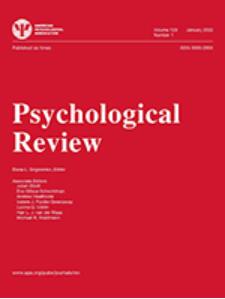Disorders of self-categorization: How and why a healthy social self-system is the cornerstone of mental health.
IF 5.8
1区 心理学
Q1 PSYCHOLOGY
引用次数: 0
Abstract
The self had a central role in early theories of psychopathology and has long been of interest to mental health practitioners. However, these early theories typically made what we consider to be two key errors: they conceptualized mental ill-health as constituting discrete categories of illness, and they conceptualized the self as inherently individualized and stable. There is a growing recognition in psychiatry and clinical psychology of the former error, with a change well underway to reconceptualize psychopathology in terms of transdiagnostic continua of symptoms rather than as discrete categories. At the same time, modern understandings of self-processes acknowledge their fluid, socially structured, and context-sensitive nature. Here, we argue that the integration of these two perspectives-into a self-categorization model of mental health with a healthy social self-system at its core-can provide new insights into both the nature of mental health and ill-health and the relevant focus for intervention. We illustrate this by exploring the implications of our analysis for three conditions (depression, schizophrenia, and autism) and report the findings of a verification study with experts in both social identity theorizing and clinical practice. We conclude by proposing key priorities for future research on self-categorization in mental health. (PsycInfo Database Record (c) 2025 APA, all rights reserved).自我分类障碍:健康的社会自我系统如何以及为什么是心理健康的基石。
自我在早期的精神病理学理论中起着核心作用,长期以来一直是心理健康从业者的兴趣所在。然而,这些早期的理论通常犯了我们认为的两个关键错误:他们将精神疾病概念化为构成离散类别的疾病,他们将自我概念化为固有的个性化和稳定性。精神病学和临床心理学越来越多地认识到前一种错误,并且正在进行一种改变,即根据症状的跨诊断连续性而不是离散的类别来重新定义精神病理学。与此同时,对自我过程的现代理解承认其流动性、社会结构性和上下文敏感性。在此,我们认为将这两种观点整合到一个以健康的社会自我系统为核心的心理健康自我分类模型中,可以为心理健康和不健康的本质以及相关的干预重点提供新的见解。我们通过探索我们对三种情况(抑郁症、精神分裂症和自闭症)的分析的含义来说明这一点,并报告与社会认同理论和临床实践专家进行的验证研究的结果。最后,我们提出了未来心理健康自我分类研究的重点。(PsycInfo Database Record (c) 2025 APA,版权所有)。
本文章由计算机程序翻译,如有差异,请以英文原文为准。
求助全文
约1分钟内获得全文
求助全文
来源期刊

Psychological review
医学-心理学
CiteScore
9.70
自引率
5.60%
发文量
97
期刊介绍:
Psychological Review publishes articles that make important theoretical contributions to any area of scientific psychology, including systematic evaluation of alternative theories.
 求助内容:
求助内容: 应助结果提醒方式:
应助结果提醒方式:


